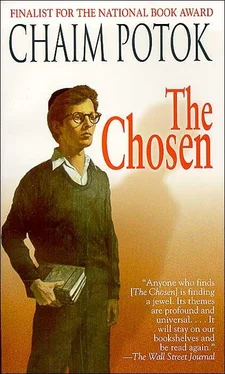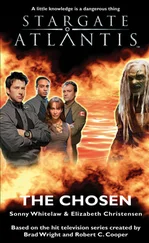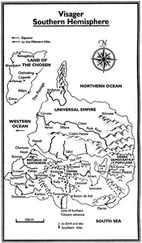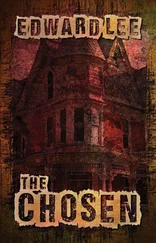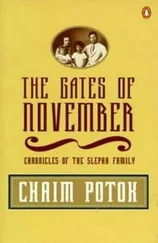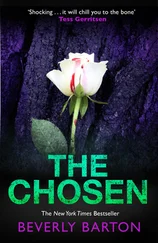'No holes,' he shouted from near home plate. 'No holes, you hear? Goldberg, what kind of solid defensive front is that? Close in. A battleship could get between you and Malter. That's it. Schwartz, what are you doing, looking for paratroops? This is a ball game. The enemy's on the ground. That throw was wide, Goldberg. Throw it like a sharpshooter. Give him the ball again. Throw it. Good. Like a sharpshooter. Very good. Keep the infield solid. No defensive holes in this war.'
We batted and threw the ball around, and it was warm and sunny, and there was the smooth, happy feeling of the summer soon to come, and the tight excitement of the ball game. We wanted very much to win, both for ourselves and, more especially, for Mr Galanter, for we had all come to like his fist-thumping sincerity. To the rabbis who taught in the Jewish parochial schools, baseball was an evil waste of time, a spawn of the potentially assimilationist English portion of the yeshiva day. But to the students of most of the parochial schools, an inter-league baseball victory had come to take on only a shade less significance than a top grade in Talmud, for it was an unquestioned mark of one's Americanism, and to be counted a loyal American had become increasingly important to us during these last years of the war.
So Mr Galanter stood near home plate, shouting instructions and words of encouragement, and we batted and tossed the ball around. I walked off the field for a moment to set up my eyeglasses for the game. I wore shell-rimmed glasses, and before very game I would bend the earpieces in so the glasses would stay on my head and not slip down the bridge of my nose when I began to sweat. I always waited until just before a game to bend down the earpieces, because, bent, they would cut into the skin over my ears, and I did not want to feel the pain a moment longer than I had to. The tops of my ears would be sore for days after every game, but better that, I thought, than the need to keep pushing my glasses up the bridge of my nose or the possibility of having them fall off suddenly during an important play.
Davey Cantor, one of the boys who acted as a replacement if a first-stringer had to leave the game, was standing near the wire screen behind home plate. He was a short boy, with a round face, dark hair, owlish glasses, and a very Semitic nose. He watched me fix my glasses.
'You're looking good out there, Reuven,' he told me. 'Thanks,' I said.
'Everyone is looking real good.'
'It'll be a good game.'
He stared at me through his glasses. 'You think so?' he asked. 'Sure, why not?'
'You ever see them play, Reuven?'
'No.'
'They're murderers.'
'Sure,' I said.
'No, really. They're wild.'
'You saw them play?'
'Twice. They're murderers.'
'Everyone plays to win, Davey.'
'They don't only play to win. They play like it's the first of the Ten Commandments.'
I laughed. 'That yeshiva?' I said. 'Oh, come on, Davey.'
'It's the truth.'
'Sure,' I said.
'Reb Saunders ordered them never to lose because it would shame their yeshiva or something. I don't know. You'll see.'
'Hey, Malter I' Mr Galanter shouted. 'What are you doing, sitting this one out?'
'You'll see,' Davey Cantor said. 'Sure.' I grinned at him. 'A holy war.' He looked at me.
'Are you playing?' I asked him.
'Mr Galanter said I might take second base if you have to pitch.'.
'Well, good luck.'
'Hey, Malter I' Mr Galanter shouted. 'There's a war on, remember?'
'Yes, sir I' I said, and ran back out to my position at second base.
We threw the ball around a few more minutes, and then I went up to home plate for some batting practice. I hit a long one out to left field, and then a fast one to the shortstop, who fielded it neatly and whipped it to first. I had the bat ready for another swing when someone said, 'Here they are,' and I rested the bat on my shoulder and saw the team we were going to play turn up our block and come into the yard. I saw Davey Cantor kick nervously at the wire screen behind home plate, then put his hands into the pockets of his dungarees. His eyes were wide and gloomy behind his owlish glasses.
I watched them come into the yard.
There were fifteen of them, and they were dressed alike in white shirts, dark pants, white sweaters, and small black skullcaps. In the fashion of the very Orthodox, their hair was closely cropped, except for the area near their ears from which mushroomed the untouched hair that tumbled down into the long side curls. Some of them had the beginnings of beards, straggly tufts of hair that stood in isolated clumps on their chins, jawbones, and upper lips. They all wore the traditional undergarment beneath their shirts, and the tzitzit, the long fringes appended to the four comers of the garment, came 'out above their belts and swung against their pants as they walked. These were the very Orthodox, and they obeyed literally the Biblical commandment And ye shall look upon it, which pertains to the fringes.
In contrast, our team had no particular uniform, and each of us wore whatever he wished: dungarees, shorts, pants, polo shirts, sweat shirts, even undershirts. Some of us wore the garment, others did not. None of us wore the fringes outside his trousers. The only element of uniform that we had in common was the small, black skullcap which we, too wore.
They came up to the first-base side of the wire screen behind home plate and stood there in a silent black-and-white mass, holding bats and balls and gloves in their hands. I looked at them. They did not seem to me to present any picture of ferocity. I saw Davey Cantor kick again at the wire screen, then walk away from them to the third-base line, his hands moving nervously against his dungarees.
Mr Galanter smiled and started toward them, moving quickly on the balls of his feet, his skullcap perched precariously on the top of his balding head.
A man disentagled himself from the black-and-white mass of players and took a step forward. He looked to be in his late twenties and wore a black suit, black shoes, and a black hat. He had a black beard, and he carried a book under one arm. He was obviously a rabbi, and I marveled that the yeshiva had placed a rabbi instead of an athletic coach over its team.
Mr Galanter came up to him and offered his hand.
'We are ready to play,' the rabbi said in Yiddish, shaking Mr Galanter's hand with obvious uninterest.
'Fine,' Mr Galanter said in English, smiling.
The rabbi looked out at the field. 'You played already?' he asked.
'How's that?' Mr Galanter said. 'You had practise?'
'Well, sure-'
'We want to practise.'
'How's that?' Mr Galanter said again, looking surprised.
'You practised, now we practise.'
'You didn't practise in your own yard?'
'We practised.'
'Well, then-'
'But we have never played in your yard before. We want a few minutes.'
'Well, now,' Mr Galanter said. 'there isn't much time. The rules are each team practises in its own yard.'
. 'We want five minutes,' the rabbi insisted.
'Well-' Mr Galanter said. He was no longer smiling. He always liked to go right into a game when we played in our own yard. It kept us from cooling off, he said.
'Five minutes,' the rabbi said. 'Tell your people to leave the field.'
'How's that?' Mr Galanter said.
'We cannot practise with your people on the field. Tell them to leave the field.' \.
'Well, now,' Mr Galanter said, then stopped. He thought for a long moment. The black-and-white mass of players behind the rabbi stood very still, waiting. I saw Davey Cantor kick at the asphalt floor of the yard. 'Well, all right. Five minutes. Just five minutes, now.'
'Tell your people to leave the field,' the rabbi said.
Mr Galanter stared gloomily out at the field, looking a little deflated. 'Everybody off!' he shouted, not very loudly. 'They want a five-minute warm-up. Hustle, hustle. Keep those arms going. Keep it hot. Toss some balls around behind home. Let's go!'
Читать дальше
